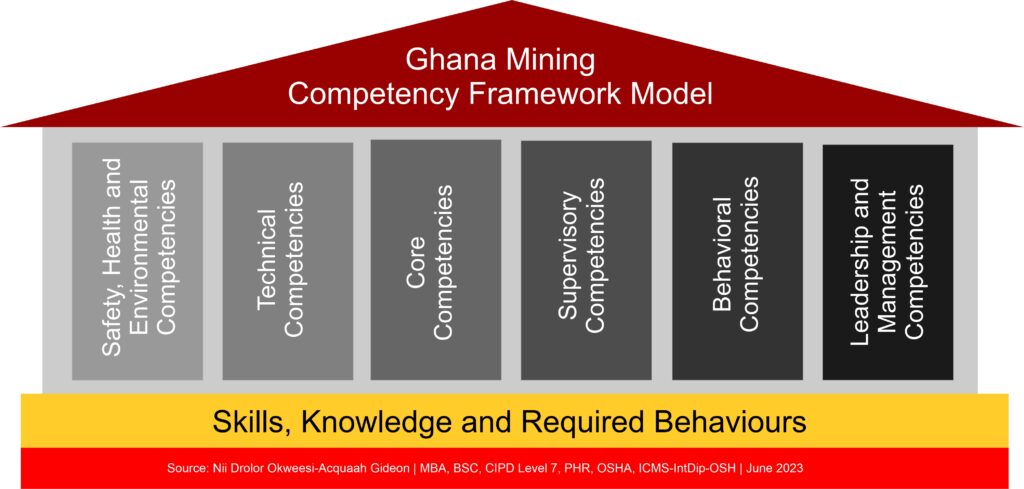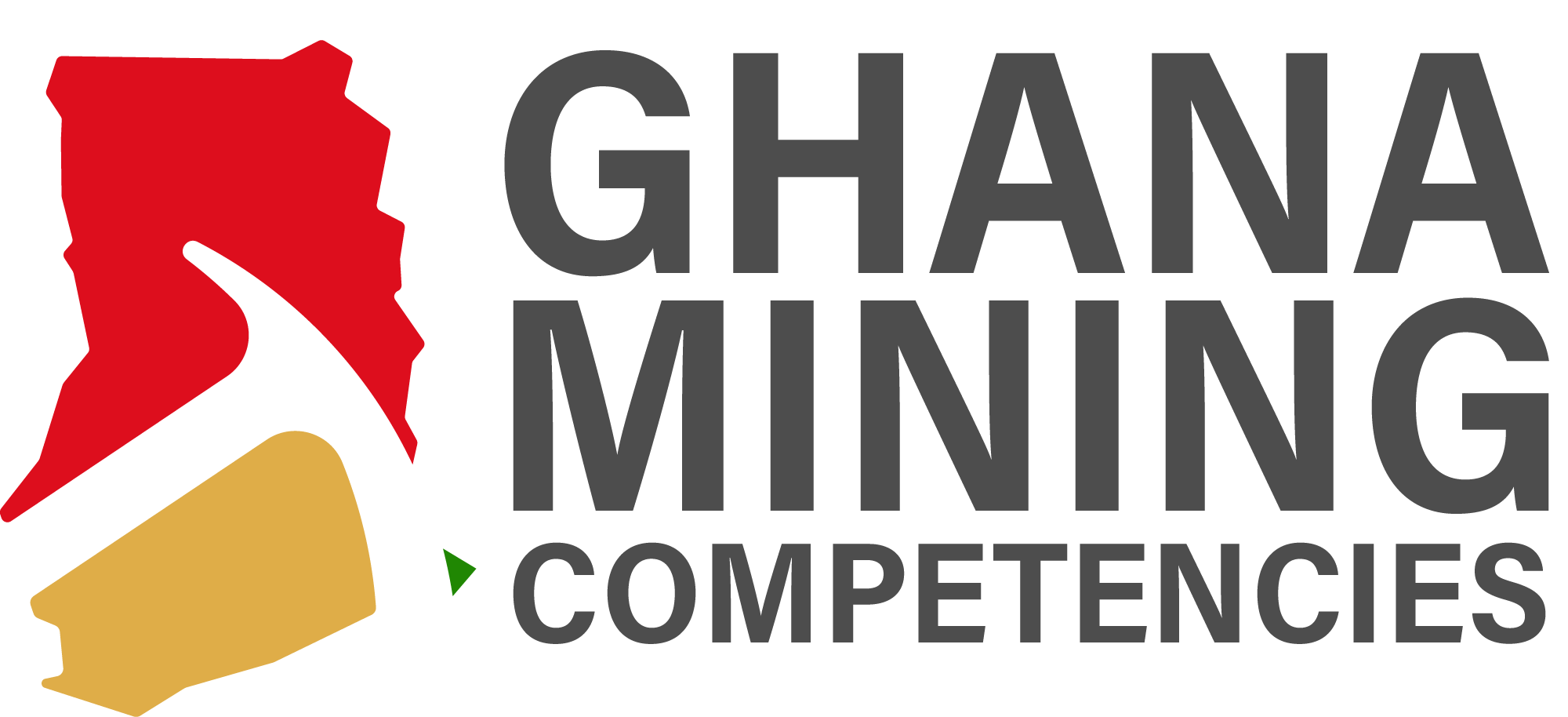Standardizing Competency Framework in Ghana’s Mining Industry
SKILLS | KNOWLEDGE | ATTITUDES
The Ghana Mining Competency Framework is a structured system or framework used in the mining industry to assess and develop the skills and competencies of workers.
It provides a standardized approach to defining and measuring the knowledge, skills, and abilities required for various roles within the mining sector, such as operators, technicians, engineers, and safety personnel.
The framework helps mining companies ensure that their workforce is adequately trained and qualified to perform their jobs safely and effectively. It is the foundation upon which training programs, assessments, and career development pathways are designed to enhance the overall competency of employees in the mining industry.

IMPORTANCE OF THE COMPETENCY FRAMEWORK
The Mining Competency Framework is important for several reasons:
- Safety: It helps ensure that mining personnel have the necessary skills and knowledge to work safely in a hazardous industry. This can reduce the risk of accidents and injuries, making the workplace safer for all employees.
- Compliance: Many countries have regulations and standards governing the mining industry. The framework helps mining companies meet these legal requirements by ensuring that their workforce is properly trained and qualified.
- Efficiency: Competent workers are more efficient and productive, leading to improved operational performance and reduced downtime. This can result in cost savings and increased profitability for mining companies.
- Career Development: The framework provides a structured pathway for employees to develop their skills and advance in their careers within the mining industry. This can lead to higher job satisfaction and retention rates.
- Industry Reputation: A skilled and competent workforce can enhance the reputation of the mining company, both locally and globally. It can attract investors and partners who are confident in the company’s ability to operate responsibly and profitably.
- Environmental Responsibility: Competent mining personnel are better equipped to implement environmental best practices and minimize the environmental impact of mining operations.
- Innovation and Adaptation: The framework can include provisions for ongoing training and upskilling, allowing the mining industry to adapt to new technologies and best practices as they emerge.
The Ghana Mining Competency Framework serves as a well-structured and comprehensive repository outlining the essential skills, knowledge, behaviors, and attributes required for effective performance across various roles within the mining sector. It provides clear guidance for both employees and employers, delineating critical competencies essential for success in specific positions within the mining industry.
The Ghana Mining Competency Framework (GMCF) comprises key elements such as Occupational Safety and Health Competencies, Technical/Functional Competencies, Core Competencies, Supervisory Competencies, Behavioral Competencies, and Leadership and Management Competencies.
Furthermore, this framework proves to be a valuable asset for institutions dedicated to Training and Development. Universities and Technical Educational Institutions can leverage it as a valuable source of information, allowing them to create content that is relevant and up-to-date, aligning with global industry practices. This plays a pivotal role in bridging the gap between academia and industry, ensuring that students are well-equipped with the necessary ideas and technical expertise, facilitating a smooth transition into the workforce.
The development and implementation of this competency framework will help all organizations in Ghana’s mining industry to effectively perform:
-
Identify Skills Gaps
Assess the skills and knowledge required for different roles, allowing organizations to identify gaps and plan for training and development programs.
-
Recruitment and Selection
Use the framework to define the criteria for hiring, ensuring that individuals possess the necessary competencies for specific positions.
-
Performance Management
Facilitate performance evaluations by providing a clear standard for assessing employee performance against established competencies.
-
Career Development
Guide employees in their career progression by identifying the competencies needed for advancement within the organization.
-
Succession Planning
The competency framework identifies key skills and attributes needed for future roles, aiding in the identification and development of potential successors.
-
Mentorship
The framework guides mentors in assessing mentees' competencies and tailoring guidance to enhance specific skills and professional growth.
-
Coaching and Skill Transfer
It serves as a roadmap for coaches to address specific competency gaps, facilitating targeted skill transfer and development.
-
Training and Development
The framework informs training programs by highlighting essential competencies, ensuring a focused approach to employee skill enhancement and career progression.
| No | Name of Competency Framework | Competency Number |
|---|---|---|
| 1 | Occupational Safety & Health Management | GMCF-OSH-MGT-001 |
| 2 | Electrical Engineering | GMCF-ELE-ENG-002 |
| 3 | Geological Engineering | GMCF-GEO-ENG-003 |
| 4 | Metallurgical & Processing Engineering | GMCF-MET-P-ENG-004 |
| 5 | Mechanical Engineering | GMCF-MEC-ENG-005 |
| 6 | Mining Engineering | GMCF-MIN-ENG-006 |
| 7 | Drilling Engineering | GMCF-DRIL-ENG-007 |
| 8 | Communications & Public Relations | GMCF-COM-PR-008 |
| 9 | Information Technology ? IT | GMCF-INF-TEC-009 |
| 10 | Supply Chain & Logistics | GMCF-SC-LOG-010 |
| 11 | Community Relations | GMCF-COM-REL-011 |
| 12 | Environmental & Sustainability | GMCF-ENV-SUS-012 |
| 13 | Heavy Duty Equipment | GMCF-HED-EQPT-013 |
| 14 | Legal & Compliance | GMCF-LEG-COMP-014 |
| 15 | Finance & Accounting | GMCF-FIN-ACC-015 |
| 16 | Human Resources Management | GMCF-HR-MGT-016 |
